De Vlaamse dichter en schrijver Arnold Sauwen werd geboren te Stokkem op 22 maart 1857. Zie ook alle tags voor Arnold Sauwen op dit blog.
Klokkenklank
‘k Zit zoo vaak in ‘t avondgrauwen
over ‘t veld naar u te schouwen,
waar ge nog in gouden schijn
ligt te scheemren, dorpje mijn!
Boven uwe roode daken
zie ‘k uw hoogen toren waken,
die de schaduw van zijn kruis
afwerpt op mijn vaderhuis.
‘k Hoor van ver uw klokken galmen,
feestlijk soms als vreugdepsalmen
en soms klagend, naar en droef,
als toen men mijn kind begroef.
Klokken, over weide en akker
luidt ge mijne jonkheid wakker,
luidt ge in klanken, droef van zin,
mij uw stillen weemoed in.
Wen uw bronzen stemmen, klokken,
‘t landvolk naar zijn haardste lokken,
is ‘t als riepen zij mij me
naar mijn dorp, in de avondvre.
Moeder wachtte eens op den drempel
daar van ‘t huis, haar liefdetempel…
Wie heet mij nog wellekom,
vader, n dat heiligdom?
‘k Ben als een die, ‘t land ontweken,
weerkeert ongekend ter streke
en voor geen vriendenhuis of hut
‘t stof van zijne voeten schudt.
Liefde, vriendschap… zij verdorden…
Dorp, ik ben u vreem
d geworden;
maar uw verre klokkenklank
roert me diep, mijn leven lang.
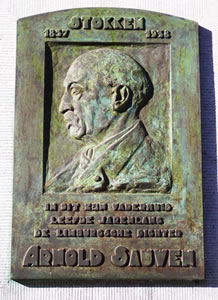
Arnold Sauwen (22 maart 1857 – 11 mei 1938)
De Amerikaanse dichter en schrijver Billy Collins werd geboren in New York op 22 maart 1941. Zie ook alle tags voor Billy Collins op dit blog.
The Best Cigarette
There are many that I miss
having sent my last one out a car window
sparking along the road one night, years ago.
The heralded one, of course:
after sex, the two glowing tips
now the lights of a single ship;
at the end of a long dinner
with more wine to come
and a smoke ring coasting into the chandelier;
or on a white beach,
holding one with fingers still wet from a swim.
How bittersweet these punctuations
of flame and gesture;
but the best were on those mornings
when I would have a little something going
in the typewriter,
the sun bright in the windows,
maybe some Berlioz on in the background.
I would go into the kitchen for coffee
and on the way back to the page,
curled in its roller,
I would light one up and feel
its dry rush mix with the dark taste of coffee.
Then I would be my own locomotive,
trailing behind me as I returned to work
little puffs of smoke,
indicators of progress,
signs of industry and thought,
the signal that told the nineteenth century
it was moving forward.
That was the best cigarette,
when I would steam into the study
full of vaporous hope
and stand there,
the big headlamp of my face
pointed down at all the words in parallel lines.

Billy Collins (New York, 22 maart 1941)
De Duitse dichter Wolfgang Bächler (een pseudoniem van Wolfgang Born) werd geboren op 22 maart 1925 in Augsburg. Zie ook alle tags voor Wolfgang Bächler op dit blog.
Bahnhof
Regen.
Der Zug hat Verspätung.
Ich warte auf dich.
Aber so lange kann kein Zug sich verspäten,
wie ich gewartet habe
auf dich
bevor ich dich kannte.
Frost
Frost weckt uns auf.
Wir werfen Mäntel
über die Träume
und knüpfen sie zu.
Der Wind verhört uns.
Wir sagen nichts aus,
treten auf unsere Schatten.
Unter den Bäumen im Schnee
finde ich die zertanzten Schuhe
der zwölf Prinzessinnen.
Ich hebe sie auf.
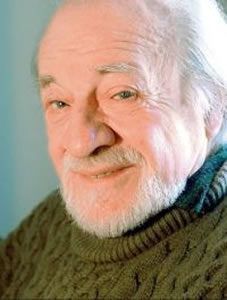
Wolfgang Bächler (22 maart 1925 – 24 mei 2007)
De Duitse dichter, schrijver en theoloog Albrecht Goes werd geboren op 22 maart 1908 in Langenbeutingen. Na de vroeg dood van zijn moeder werd hij door zijn grootmoeder in Berlin-Steglitz opgevoed. Vanaf 1926 studeerde hij germanistiek en geschiedenis, later theologie in Tübingen en Berlijn. In 1931 werd hij vicaris in Stuttgart, in 1933 dominee in Unterbalzheim, in 1939 in Gebersheim. Tijdens WO II diende hij als zielzorger in hospitalen in Rusland, Polen, Hongarije en Oostenrijk. Na de oorlog werd streed hij actief tegen de herbewapening. Zijn eerste bundel Verse verscheen in 1932, gevolg in 1934 door Der Hirte. In het verhaald Das Brandopfer uit 1954 thematiseerde hij de jodenvervolging. Het werk werd ook verfilmd.
Nach schwerem Winter
Ob dir gleich in winterwährend
Dunkler Welt den Sinn versehrt
Schwermut, die der süßen Hoffnung
Flügelschlag und Flug verwehrt,
Ob der Hall vom Schrei der Krähen
Dir im Ohr noch, lang und bang,
Und aus Nächten, vieldurchwachten,
Klagender, des Windes Klang –
Ach das Herz, es mild zu trösten,
Ist das Kleine groß genug:
Eine gelbe Krokusblüte,
Einer Wolke Frühlingszug.
Landschaft der Seele
Kein Himmel, nur Gewölk ringsum
Schwarzblau und wetterschwer.
Gefahr und Angst. Sag: – wovor?
Gefahr: und sprich – woher?
Rissig der Weg. Das ganze Feld
Ein golden-goldner Brand.
Mein Herz, die Hungerkrähe fährt
Kreischend über das Land.
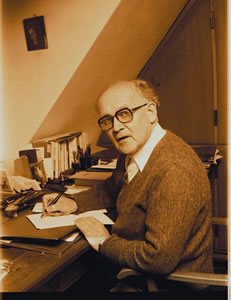
Albrecht Goes (22 maart 1908 – 23 februari 2000)
De Engelse schrijver Nicholas Monsarrat werd geboren op 22 maart 1910 in Liverpool. Hij bezocht Trinity College, Cambridge om rechten te studeren, maar de studie verveelde hem en hij begon te schrijven. Hij werkte aanvankelijk als freelancer voor kranten terwijl hij toch in een tijdsbestek van vijf jaar vier romans en een toneelstuk voltooide. Tijdens WO II diende hij op zee en was uiteindelijk de commandant van een fregat. Na de oorlog ging hij in diplomatike dienst. Zijn bekendste roman is The Cruel Sea uit 1951, gebaseerd op zijn eigen ervaringen.
Uit: The Cruel Sea
„THIS IS the story — the long and true story — of one ocean, two ships, and about a hundred and fifty men. It is a long story because it deals with a long and brutal battle, the worst of any war. It has two ships because one was sunk, and had to be replaced. It has a hundred and fifty men because that is a manageable number of people to tell a story about. Above all, it is a true story because that is the only kind worth telling.
First, the ocean, the steep Atlantic stream. The map will tell you what that looks like: three-cornered, three thousand miles across and a thousand fathoms deep, bounded by the European coastline and half of Africa, and the vast American continent on the other side: open at the top, like a champagne glass, and at the bottom, like a municipal rubbish-dumper. What the map will not tell you is the strength and fury of that ocean, its moods, its violence, its gentle balm, its treachery: what men
can do with it, and what it can do with men. But this story will tell you all that.
Then the ship, the first of the two, the doomed one. At the moment she seems far from doomed: she is new, untried, lying in a river that lacks the tang of salt water, waiting for the men to man her. She is a corvette, a new type of escort ship, an experiment designed to meet a desperate situation still over the horizon. She is brand- new; the time is November 1939; her name is H.M.S. Compass Rose“.

Nicholas Monsarrat (22 maart 1910 – 8 augustus 1979)
De Franse schrijver Érik Orsenna werd geboren in Parijs op 22 maart 1947 als Érik Arnoult. Zie ook alle tags voor Erik Orsenna op dit blog.
Uit: Les chevaliers du subjonctif
„Et puis ma voix, la plus douce de mes voix, est entrée en action :
-L’ île que nous survolons n’est pas comme les autres, patron. Sij’ai bien compris, le subjonctif est l’univers du doute, de l’attente, du désir, de l’espérance, de tous les possibles… Comment voulez-vous que l’île du doute, de l’attente, du désir, de l’espérance, de tous les possibles ait des contours bien définis ?
Longtemps, il réfléchit. Avant de se retourner vers moi.
-Ce n’est pas faux, ce que tu racontes là.
-Vous savez, vous, donner des limites à vos doutes, à votre désir, à votre espérance ? Soyez franc. En êtes-vous capables, patron, en dépit de votre âge et de votre expérience ? Par définition, le possible n’a pas de limites, non ? »
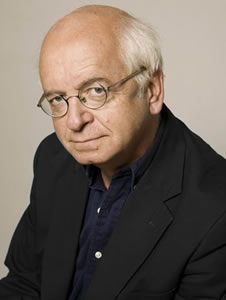
Érik Orsenna (Parijs, 22 maart 1947)
De Canadese schrijfster Gabrielle Roy werd geboren op 22 maart 1909 in Saint Boniface, Manitoba. Zie ook alle tags voor Gabrielle Roy op dit blog.
Uit: Street of Riches
„When he built our home, my father took as model the only other house then standing on the brief length of Rue Deschambault — still unencumbered by any sidewalk, as virginal as a country path stretching through thickets of wild roses and, in April, resonant with the music of frogs. Maman was pleased with the street, with the quiet, with the good, pure air there, for the children, but she objected to the servile copying of our neighbor’s house, which was luckily not too close to ours. This neighbor, a Monsieur Guilbert, was a colleague of my father’s at the Ministry of Colonization and his political enemy to boot, for Papa had remained passionately faithful to Laurier’s memory, while Monsieur Guilbert, when the Conservative party came into power, had become a turncoat. Over this the two men quarreled momentously. My father would return home after one of these set-tos chewing on his little clay pipe. He would inform my mother: “I’m through. I’ll never set foot there again. The old jackass, with his Borden government!”
My mother concurred: “Certainly. You’d do far better to stay home than go looking for an argument wherever you stick your nose.”
Yet no more than my father could forgo his skirmishes with Monsieur Guilbert could she forgo her own with our neighbor’s wife.
This lady was from St. Hyacinth, in the Province of Quebec, and she made much of it. But above all she had a way of extolling her own children which, while lauding them, seemed to belittle Maman’s. “My Lucien is almost too conscientious,” she would say. “The Fathers tell me they have never seen achild work so hard.”
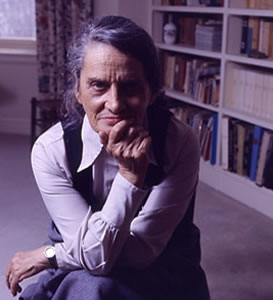
Gabrielle Roy (22 maart 1909 – 13 juli 1983)
De Zwitserse schrijfster Eveline Hasler werd geboren in Glarus op 22 maart 1933. Zie ook alle tags voor Eveline Hasler op dit blog.
Uit: Spaziergänge durch mein Tessin
„Nie ist das Tessin schöner als im Dezember. Die Touristen sind fort, zurück bleiben die stillen Liebhaber. Unter der Glasglocke des winterlichen Himmels rücken die Dörfer am Fuß des Gambarogno zusammen, die Berge erscheinen rundlicher, sanfter, und der rötliche Waldüberzug der Hänge wird flauschig. Im See zeigt sich auf der leicht bewegten Wasserfläche das Spiegelbild: kupferne Farbtupfer in metallischer Bläue. Den ganzen Tag gibt es zu schauen, denn im Winter wird der Gambarogno mit seinen Hängen zu einer Projektionsfläche des Lichts.
Nur mit Mühe stemmt sich morgens um neun der Sonnenball von der Rückseite des Bergs auf die Höhe des Monte Paglione. Selbst noch unsichtbar, legt er als ersten Gruß schräge Lichtbahnen über die benachbarten Hügel. Dann erscheint ein Goldrand über der Kuppe, gleißt, funkelt, die Sonnenscheibe steigt langsam auf. Der erloschene Berghang beginnt zu leben und verwandelt sich in ein waberndes, regenbogenfarbiges Strahlengeflecht. Stündlich verändert sich während des Tages die Beleuchtung und der Charakter der Hügelzüge. Licht und Schatten grenzen sich schärfer ab als im Sommer, topographische Unebenheiten treten reliefartig hervor. Auch die Abende haben ihr feierliches Ritual.

Eveline Hasler (Glarus, 22 maart 1933)
De Franse dichter Léon Deubel werd geboren op 22 maart 1879 in Belfort. Zie ook alle tags voor Léon Deubel op dit blog.
Tombeau du Poète
Par les sentiers abrupts où les fauves s’engagent,
Sur un pic ébloui qui monte en geyser d’or,
Compagnon fabuleux de l’aigle et du condor,
Le Poète nourrit sa tristesse sauvage.
A ses pieds, confondus dans un double servage,
Multipliant sans cesse un formidable effort,
Les Hommes, par instants, diffamaient son essor ;
Mais lui voyait au loin s’allumer des rivages.
Et nativement sourd à l’injure démente,
Assuré de savoir à quelle ivre Bacchante
Sera livrée un jour sa dépouille meurtrie ;
Laissant la foule aux liens d’un opaque sommeil,
Pour découvrir enfin l’azur de sa patrie
Il reprit le chemin blasphémé du soleil !

Léon Deubel (22 maart 1879 – 4 juni 1913)
Brons van Hiroatsu Takata
De Engelse schrijver Edward Moore werd geboren in Abingdon, Berkshire op 22 maart 1712. Moore was de zoon van een protestantse dominee. Zijn vader overleed toen hij 10 jaar oud was, waarna hij onder de hoede kwam van zijn oom John Moore, een schoolmeester uit Somerset. Hij ging in de leer bij een linnenhandelaar en oefende uiteindelijk zelf dit vak uit. Dit was echter geen succes, en hij richtte zich vervolgens op het schrijven. In 1744 boekte hij een eerste bescheiden succes met Fables of the Female Sex, waaraan ook toneelschrijver Henry Brooke bijdroeg. In 1748 verschenen The Trial of Selim the Persian en The Foundling. Dit laatste stuk werd door Brooke voorzien van een proloog. De komedie, die in februari 1747 in première ging in het Koninklijk Theater Drury Lane, werd door de critici niet erg goed ontvangen. Meer succes kende hij met Gil Blas (Drury Lane, februari 1751). In hetzelfde theater ging in februari 1753 de tragedie The Gamester in première. Dit stuk, over gokverslaving, kende veel succes, niet in de laatste plaats door de medewerking van de befaamde acteur David Garrick. Naast toneel schreef Moore ook gedichten, in 1756 verschenen onder de titel Poems, Fables and Plays.
Uit: The Gamester
„Mrs. Bev. BE comforted, my dear; all may be well yet. And now, methinks, the lodgings begin to look with another face. O sister! sister! if these were all my hardships; if all I had to complain of were no more than quitting my house, servants, equipage and show, your pity would be weakness.
Char. Is poverty nothing then?
Mrs. Bev. Nothing in the world, if it affected only Me. While we had a fortune, I was the happiest of the rich: and now ’tis gone, give me but a bare subsistance, and my 422 husband’s smiles, and I’ll be the happiest of the poor. To Me now these lodgings want nothing but their master. Why d’you look so at me?
Char. That I may hate my brother.
Mrs. Bev. Don’t talk so, Charlotte.
Char. Has he not undone you? Oh! this pernicious vice of gaming! But methinks his usual hours of four or five in the morning might have contented him; ’twas misery enough to wake for him till then: need he have staid out all night? I shall learn to detest him.
Mrs. Bev. Not for the first fault. He never slept from me before.
Char. Slept from you! No, no; his nights have nothing to do with sleep. How has this one vice driven him from every virtue! nay, from his affections too!—The time was, sister—
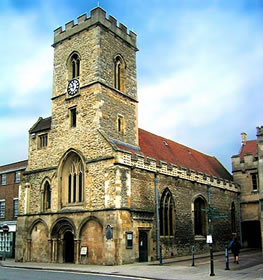
Edward Moore (22 maart 1712 – 1 maart 1757)
Abingdon, St. Nicholas’ Church (Geen portret beschikbaar)
Zie voor onderstaande schrijver ook mijn blog van 22 maart 2007.
De Duitse schrijver en publicist Hans Grimm werd op 22 maart 1875 geboren in Wiesbaden
De Tsjechische schrijver Karel Poláček werd geboren op 22 maart 1892 in Reichenau.
De Tsjechische dichter en schrijver Ludvík Kundera werd geboren op 22 maart 1920 in Brünn. Zie ook mijn blog van 22 maart 2007.en ook mijn blog van 22 maart 2008.
